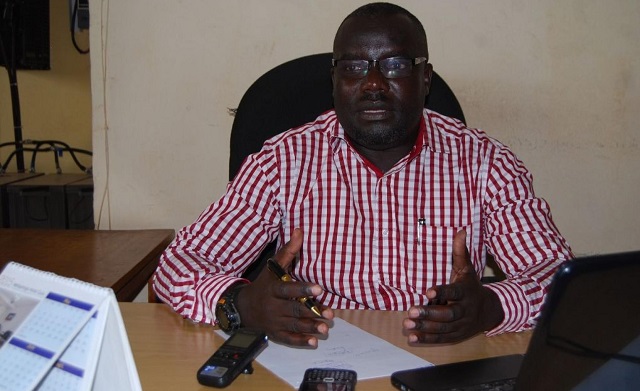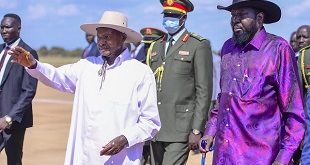
Kampala, Uganda | THE INDEPENDENT | Acholi Parliamentary Group-APG, an association that brings together all Members of Parliament in Acholi sub-region is set to hold an election to get new leaders mandated to steer the agenda of the group.
This comes at the expiry of the term of office for its outgoing office bearers with the end of the tenth parliament.
Formed in 1989, APG was a popular convocation of Acholi legislators elected in the National Resistance Council, an interim parliament created by the National Resistance Movement-NRM government.
Its formation came at a time the region battled the brunt of various insurgencies including one of the longest and most brutal, the Lord’s Resistance Army-LRA rebel insurgency led by elusive leader Joseph Kony.
Zachary Olum, one of the group’s founding members and former chairperson in the eighth parliament told Uganda Radio Network in an interview that APG was solely formed to unite its members in speaking with a common voice.
Olum says the region by then was being ravaged by a war that left trails of destruction, death and untold sufferings that needed a common voice to demand the government’s commitment to ending it.
“Our main aim was to unite members of NRC irrespective of their political affiliation,” he says. “The region was witnessing war that was ravaging the region, we found it worthy to sit down and come with a common mouthpiece advocating for the end of the war. APG was one of the first sub-regional parliamentary groups to be formed in the Parliament of Uganda.
According to Olum, the group scored great achievements throughout the sixth, seventh, eighth, and ninth parliament in ensuring the government’s swift actions in ending the insurgency and advocating for livelihood improvement of the locals after the war.
He says the group worked closely with the religious leaders, Resident District Commissioners, and district chairpersons making it more vocal for a common agenda of the region.
But years later after it’s formation and tremendous success registered at the height of LRA insurgencies, what was known as the most vocal mouthpiece of the Acholi sub-region begun crumbling towards the end of the ninth parliament.
APG has in the recent past been rocked with disunity, infights, and political indifferences among its members that threatened its core foundation and nearly triggering its collapse.
Notable examples can be traced from 2014 rifts between former Aruu County legislator Samuel Odonga Otto and Omoro County Member of Parliament, also Speaker of Parliament Jacob Oulanyah.
Otto at the time announced plans to conduct underground mobilization to oust Oulanyah from his Omoro County seat after accusing him of betraying people in the region in the passing of the controversial Public Order Management Bill as an Act of Parliament.
In January last year, Otto yet again broke into a fist fight with his counterpart Anthony Akol, the Kilak North County Member of Parliament on allegations that the latter was secretly brokering with the government to sell off community land in Amuru district.
The suspension of six members of the group in 2018 subscribing to the National Resistance Movement party also further worsened the already fragile unity in APG. The APG Secretary-General, also Kilak South legislator Gilbert Olanya at the time announced the suspension of the members accusing them of taking part in voting for the removal of the presidential age limit from the constitution.
Martin Ojara Mapenduzi, the Bardege-Layibi division legislator and former Gulu district chairperson says such intrigue and disunity that took center stage in APG made the group unpopular and in many ways affected its success.
Mapenduzi notes that APG members also didn’t pursue many critical issues that were of concern and affected the region citing continued environmental degradation and unresolved land matters.
“The APG started talking about the environment, they abandoned it,” says Mapenduzi. ‘The issue of Apaa is always there unresolved, the APG only responded when there was a problem and I don’t think that was the best way.”
Mapenduzi believes that for APG to function normally and pursue all its set agenda, the members should agree on the establishment of a functional secretariat.
He says through the secretariat which will be sustained with members monthly deduction, APG will be able to make timely response and in unison to matters of concern to the people in Acholi sub-region.
Mapenduzi cites that once the functional secretariat becomes a practical idea, they will have desks to handle media and communication, research and data management, emergency response, and humanitarian issues among others.
“When we have a functional secretariat, APG will speak with facts and figures, not just political statements, when APG decides to speak, the statement should be fully packed with facts and figures which challenge certain government decisions,” he says.
Mapenduzi says there is a need to rebrand the image of APG arguing that the leaders need to now be more organized other than a “firefighting approach”.
“There is definitely need to rebrand APG, if the members feel I have a contribution to provide, I will make that contribution as chairperson for APG.”
Gilbert Olanya, Kilak South MP, also the APG Secretary-General acknowledges that the group has indeed had its fair share of challenges that blurred its success over the years.
Olanya however blames the challenges that rocked the APG on political party differences.
“Party differences is what majorly divided us in the tenth parliament, party intrigue has always infiltrated our group and it remained a big challenge to us,” he told URN in an interview.
Olanya says the group has scored success in advocating for several government programmes for the people recovering from the brunt of the LRA insurgencies, and confronted the government on dubious land deals.
“Despite the challenges, we have collectively achieved many projects like the Peace, Recovery and Development Plan (PRDP), Northern Uganda Social Action Fund-NUSAF, ideas we fronted and they have helped our people,” he said.
A report by Uganda Bureau of Statistics-UBOS recently released on the poverty index in the region has however sparked criticism on APG’s failure to join hands in addressing the poverty situation. According to the Uganda National Household Survey, 2019/2020, 65.7 percent of people in the Acholi sub-region are still poor.
Zachary Olum, former Nwoya County legislator in eight Parliament told URN in an interview that the high poverty levels in Acholi at a time the region is peaceful is shameful.
Olum says leaders in the region especially APG should have focused on addressing poverty, education, and health as a common issue for the people of Acholi.
“Even if the war was over, I still believe things like education, health, and poverty should have attracted them, they should have looked at these issues as a common issue for Acholi.”
Time for new leaders in APG?
As APG finalizes to make a move on the next chapter of its election, a section of the public believe the time is ripe for new and first-time members of Parliament to steer leadership of APG.
Out of the 28 members of parliament from the Acholi sub-region who were recently sworn into the eleventh parliament, 13 are new faces. 12 of the MPs defeated incumbent legislators and vocal members of the APG in the tenth Parliament while one took over a newly created constituency in Gulu city in January parliamentary polls.
Martin Aliker, a political pundit in Gulu City observes that the new cohort of legislators from the region are highly educated and can make good leaders.
He says: “I must say the new team have two striking outstanding advantages, they come across as highly elitists in approach, most of them have attained a Master’s level of education and they are much younger. In the previous lot, some of them upgraded their education while in Parliament.”
Aliker however says whereas there is no doubt the new members of Parliament can take over APG leadership, they can only be successful if they come up with a clear working agenda in the post recovering Northern Uganda.
But Philip Polly Okin Ojara, Chua West County legislator and APG Chairperson dismisses allegations that the group has failed.
Okin says APG is not a substitute for the role of legislators adding that where there has been cases of disunity and bickering, it shouldn’t be tagged on the group but rather individual members.
“There is a problem with people, they think APG chairperson is a manager, but how can you manage MPs, even the speaker can’t manage MPs, so how can the chairperson of APG manage MPs?” asks Okin. “As chairperson, you are not there as a manager, you are there to make sure that if there is something contentious for the Acholi people you address it together.”
He notes that against all the negative criticism, APG has been vocal on many issues in the region citing the nodding syndrome, Gulu city status, Apaa land boundary conflict and electricity outage among others.
Okin says he would still continue to lead if a consensus is reached among the members that he carries the mantle of chairing the association.
*****
URN
 The Independent Uganda: You get the Truth we Pay the Price
The Independent Uganda: You get the Truth we Pay the Price



